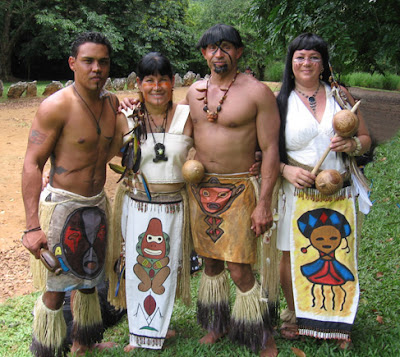Blues From The Blue Men

Last week, half of my CD tower collapsed. It covers an entire wall and holds hundreds of my lovingly collected CDs. The CDs crashed to the floor. Some are cracked, some are scratched. To say that I'm sad about it is an understatement. I haven't been able to deal with it at all. I just look at the piles of music and turn away because I can't bear to go through them and see what I've lost. Today I realized that it was the left side of the case that collapsed. This means that all of my American music genres--blues, jazz, rock, soul and hip hop are in piles on the floor. My global music--Latin, reggae, soca, calypso, African, Celtic and everything in between, rests safely on shelves in the other half of the tower. I haven't figured out what this means but for now it means that I only have access to my global music.
The feeling of loss and regret that hovers over me has created a hankering for the blues. I can't reach for B.B. or Buddy or John Lee but I can listen to Tinariwen. As a group of Tuaregs from Mali, they translate the feeling of personal longing and nostalgia like nobody else outside of the Mississippi Delta. Tuaregs are a nomadic ethnic group that have been forced out of their Sahara Desert region and nomadic lifestyle because of drought, war and oppression.
Covered in sweeping, indigo –dyed, (hence the name blue men) robes that obscure their faces, Tuaregs have existed since antiquity. For centuries, they have crossed the Sahara desert that runs across northwest Africa and established a rich culture noted for military ability, silver and gold craftsmanship, and veiled men instead of women. Political turmoil related to drought and government apathy, led to fierce Tuareg rebellions in Mali and Niger during the 90s. The uprisings created a community of exiled Tuaregs, separated for the first time from the desert culture that had sustained them from the beginning.
Tinaiwren (which means desert in plural) was created as a response to this separation. The six-member group of exiled Tuaregs formed in Algeria in 1979, driven by the need to express the realities of life in exile. Their repertoire includes a raw, rolling, sound that captures the pain of their vanishing culture and their hope for the future. These Sahara songs are dominated by pure electric guitar riffs, spare percussion and moody vocals, which echo American blues with uncanny clarity. This isn't mere coincidence however, since the origins of the blues can be traced back to the region around the Niger River, where it turns south after flowing through the desert and towards the coast of Nigeria. It's an area where the Tuaregs have lived for centuries, so this blues legacy is as much a part of their culture as camels, robes and sand dunes.
Tinariwen just released their third album, Imidiwan:Companions (World Village. It's filled with the feeling of assuf, which loosely translates to the blues. Despite the association with sadness, blues is also about rebellion and revolution. All the best blues artists, from Robert Johnson to Koko Taylor, defied society and expectations to play the blues and push for change. Tinariwen continues that tradition and I'll be listening to them as I go through my CDs and face the changes I'll have to make:



Comments
Greetings from London.
Cubano, thanks. Tinariwen really delves into a lot of emotions for me.
Ibou, they do rock. I've seen them too and love their performances.
there's nothing better than desert blues!